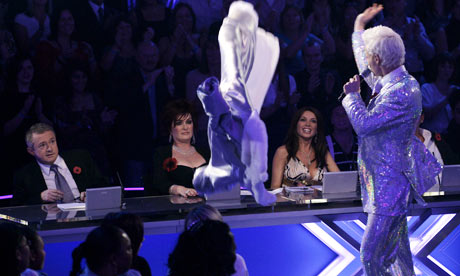
I didn't expect to love the Literary Death Match. A bookish evening in the upstairs of the Old Queen's Head (think chandeliers, pale green walls, elaborate rococo moulding), in Islington? Could it be any more middle-class, more asymmetrical haircut, more vintage black-rimmed spectacles? I was totally prepared to plaster on my best English smirk; I was totally taken aback when I realised that I actually felt exhilarated.
The Literary Death Match is the brainchild of Todd Zuniga, the affable editor of Opium, an American literary magazine now (despite the bad odds of print) going strong in its eighth year. (Full disclosure: Zuniga is a friend of a close friend, although this week was the first time I met him.) Launched in New York, but now a key event on the cultural calendar in several American cities (last night was the European debut), the Death Match runs in three rounds, like a sort of manic, jolly, literary talent competition mixed with a bit of a game of chance.
In the first rounds, two pairs of writers read their work back-to-back; the victors are decided by a panel of three judges, who rate them on literary merit, "intangibles", and performance. The final round sees the victors of the first to go head-to-head in various, less literary challenges (last night's was a card game that no one seemed quite sober enough to understand, which added to the mirth), to see the ultimate winner crowned.
I go to a lot of readings, and I have trouble keeping a straight face when people perform their work in that special toneless way they do when they are being Serious Poets, but there was no need: from the moment that Submarine author Joe Dunthorne launched into an ebullient performance of a middle-class rap about status ("You're still gonna die" he exhorted the audience to cry out in a call-and-response segment), the room was filled with energy and enthusiasm and not a whit of cynicism.
The panel of judges – Luke Brown, Laura Dockrill, Tim Clare – were like a non-obnoxious literary version of the X-Factor panel, and the audience beamed as Tim Wells described in verse his desire to make his glasses fog up, Nick Harkaway read excerpts from his first novel ("I like that bit!" he grinned, boyish in a self-consciously horrible green-and-yellow striped jacket) and Amber Marks, the eventual victor, deadpanned her way through an essay on the preposterous use of animals (coke-sniffing rats?) in law enforcement.
Now, I'm aware that my passion and investment in all things publishing can be a little esoteric; that issues that seem of extreme importance to me and a handful of acquaintances are, to most of humanity, tedious and mundane. So I brought along my friend Lucy, as a bellwether: she's a passionate reader, yes, but works as a solicitor and doesn't keep up closely with current literary movements (she rates Mrs Miniver as her favourite book). "That," she said, as we walked towards the Tube station, "was completely brilliant".
And I think I know why: the joie de vivre of the Death Match seems driven in large part by the very American optimism of the young literary scene on the left side of the Atlantic. Where those of us on this side of the pond (and after six years in the UK, I certainly am more deeply entrenched in this group than the former) wearily bicker about whether contemporary novelists are any good at all, whether the publishing industry is corrupt, the menace of the ebook, our Yankee literary counterparts are determined, in large part, to carry on writing and performing their words for the sheer joy of it. And out of this joy grows really good work, and a positive, inspiring literary community, the energy of which buzzed through the room at the Death Match last night.
Yes, I admit it: for a few hours in an Islington pub last night, I felt distinctly delighted to be American.

